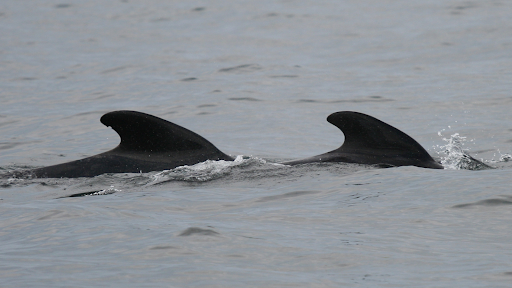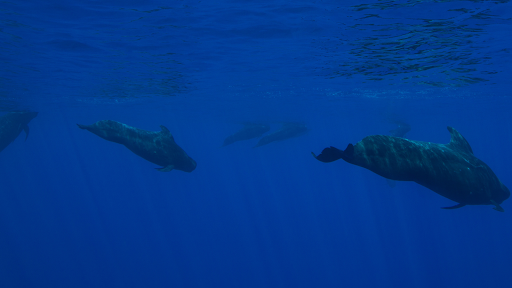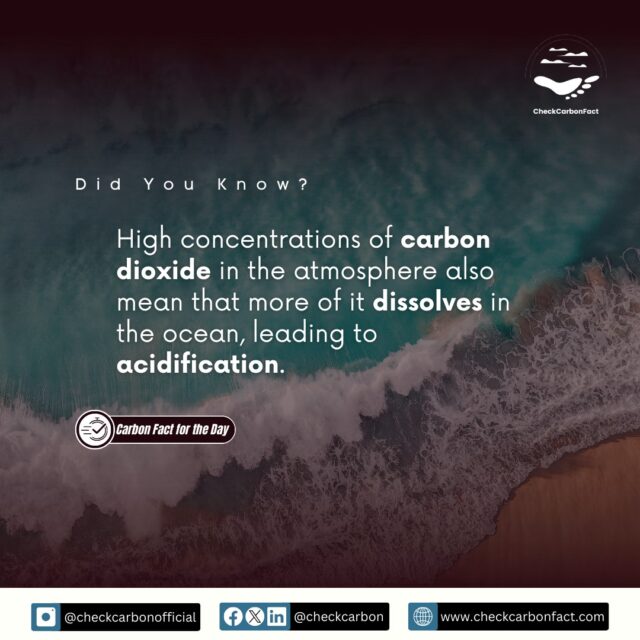
15 Jul Tragic Mass Stranding Leaves 77 Pilot Whales Dead in Orkney
In a heartbreaking and significant event, more than 77 long-finned pilot whales were found stranded on the shores of Sanday Island, part of Scotland’s Orkney archipelago, on Thursday, July 11, 2024. This incident marks one of the larger mass strandings recorded in the United Kingdom, shedding light on the tragic consequences that can affect these majestic marine creatures.
What do we know about this incident and what role could climate change have played? Read to find out.
The Stranding Event
The British Divers Marine Life Rescue (BDMLR) organization was alerted early on Thursday about the stranding event. Upon arrival, rescuers found 65 of the whales already dead. Despite their best efforts, the remaining 12 whales, which were still alive but severely injured, had to be euthanized to prevent further suffering. BDMLR is reported to have explained: “Sadly, the remaining 12 pilot whales have been euthanized due to their condition deteriorating from the many hours they have spent stranded on the beach.”
The whales suffered from crush injuries caused by their own weight and likely inhaled water as the tide came in, exacerbating their dire situation. The incoming tide also caused the whales to sink deeper into the sand, making it impossible for them to refloat themselves. The pod included males up to seven meters (22 feet) long, as well as females, calves, and juveniles. This tragic scene underscores the vulnerability of these creatures when they are out of their natural element.
The BDMLR is working to recover as many of the whales as possible for post-mortem examinations to gather more information and possibly determine the cause of the stranding. Mass strandings, although tragic, are not uncommon among pilot whales. Last year, 55 pilot whales were found stranded on the island of Lewis, off northwest Scotland. Globally, even larger strandings have occurred, particularly in regions like New Zealand and Australia. The exact cause of the stranding remains unknown. Experts speculate that one whale may have encountered trouble, prompting the rest of the pod to follow and ultimately strand themselves.
Mass strandings have become more common in Scotland over the last 10 years, and also the size of the mass and the number of animals that it involved. However, this mass stranding is believed to be the largest in Scotland since the establishment of the Scottish Marine Animal Stranding Scheme (SMASS) in 1995. Comparable events in recent history include the stranding of 55 pilot whales on Lewis last year and an event in 2011 where 60-70 whales entered shallow waters in Sutherland. The largest recorded UK stranding occurred in 1927 when 126 out of over 130 false killer whales died in the Dornoch Firth, Highlands.

The Social Nature of Pilot Whales
While the exact cause of this tragic stranding remains unknown, pilot whales are known for their strong social bonds and tendency to travel in tightly-knit groups. Molly Brown, BDMLR’s rescue and community coordinator, is reported to have highlighted this aspect: “Pilot whales are a really social species. They really rely on their family bonds. So, it might have been that just one of them got into difficulty and the rest of the pod just stranded with it because they stick together. In moments of need, they never leave each other’s side.” This social behavior, while usually a strength, can lead to tragic outcomes when one member of the group encounters trouble, causing the entire pod to follow and ultimately face a similar fate.
The Role of Climate Change
While the exact cause of this particular stranding remains unknown, it raises important questions about the broader environmental factors that might be contributing to such events. Climate change, with its far-reaching impacts on marine ecosystems, cannot be overlooked.
Rising sea temperatures and changing ocean currents, driven by climate change, affect the distribution of prey and can lead to disorientation in marine species. Pilot whales, like many other marine animals, rely on specific environmental cues for navigation and foraging. Disruptions to these cues can cause them to venture into unfamiliar and dangerous areas.
Additionally, increased storm frequency and intensity, another consequence of climate change, can physically displace marine animals and lead to higher instances of strandings. The degradation of marine habitats and the increasing presence of pollutants in the ocean further compound these challenges, putting additional stress on marine life.
With the whales now deceased, the focus shifts to the disposal of the bodies. Orkney Islands Council is in discussions with community representatives to determine the best course of action. Previous protocols have allowed nature to take its course, but given the scale of this event and potential public health implications, more definitive measures such as burial or relocation to a large grave site are being considered.
A Call to Action
The BDMLR is working to recover as many of the whales as possible for post-mortem examinations to gather more information and possibly determine the cause of the stranding. Such research is crucial in understanding these events and devising strategies to prevent them in the future.
Mass strandings, although tragic, are not uncommon among pilot whales. This incident in Orkney serves as a poignant reminder of the delicate balance within marine ecosystems and the ongoing need for research and conservation efforts to protect these remarkable creatures. As we continue to grapple with the effects of climate change, it is essential to enhance our understanding of its impacts on marine life and to develop more robust conservation strategies.
The tragic mass stranding of 77 pilot whales in Orkney is a somber call to action. It underscores the interconnectedness of our environment and the urgent need to address the factors, including climate change, that threaten the survival of marine species. Through collective efforts in research, conservation, and policy, we can hope to mitigate such tragedies in the future and ensure a safer world for these magnificent creatures.
Conclusion
The mass stranding of 77 pilot whales on Orkney’s shores is a tragic reminder of the fragility of marine life and the challenges faced in rescue operations. As experts investigate the causes and implications of such events, the emotional and environmental impact on the local and broader scientific communities is profound. By understanding and preventing these occurrences, future tragedies can be mitigated, preserving these magnificent creatures.
This stranding highlights the delicate balance within marine ecosystems and underscores the ongoing need for research and conservation efforts. Addressing climate change and protecting marine habitats are crucial to preventing such devastating events. Conservation organizations and governments must collaborate to reduce greenhouse gas emissions, protect critical habitats, regulate maritime activities, and fund research to understand mass strandings and develop effective response strategies. It is essential for the global community to recognize the interconnectedness of all life on Earth and take collective action to preserve the health and diversity of our planet’s oceans.
Carbon Fact for the Day

[wen_cta id=”2716″]

No Comments